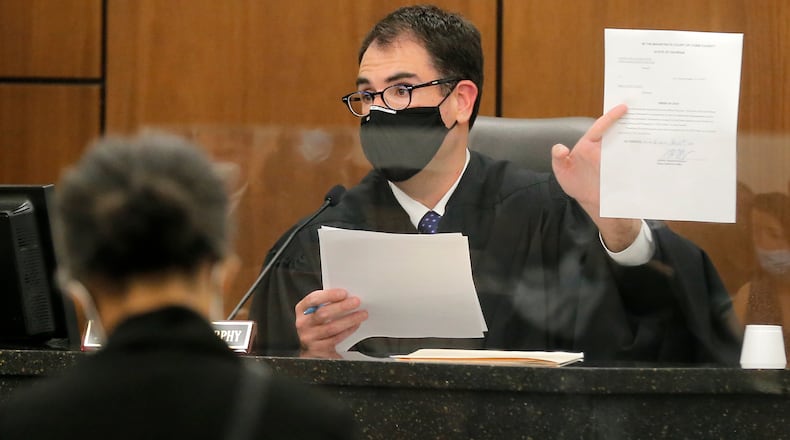The U.S. Supreme Court ruling to strike down the national moratorium on evictions is expected to trigger a surge of tenant removals in much of metro Atlanta.
It won’t be an immediate tidal wave, since evictions depend on court and law enforcement staff in each county to carry them out. But the Centers for Disease Control and Prevention’s moratorium, which had been meant to expire Oct. 3, was holding back the process against many households.
The moratorium had never been watertight. Landlords filed for evictions and judges issued writs, but the ban prohibited marshals and sheriffs from carrying out the orders, said Dan Pasciuti, a sociologist at Georgia State who has studied the issue. “So the immediate impact of the Supreme Court decision is that all those writs that have been sitting on law enforcement desks can now go forward.”
In the next few days, he said, thousands of removals are likely in metro Atlanta after the Supreme Court’s 6-3 vote late Thursday to end the federal moratorium.
Between 400 and 500 writs are awaiting execution in Fulton County, according to attorney Viraj Parmar, who manages the Housing Court Assistance Center at the courthouse. “I am worried about next week. A lot of tenants who thought they were protected won’t know they are not, until the marshals show up at the door.”
The moratorium’s end won’t hit all counties equally. Some virtually ignored it all along, while in DeKalb, a judge had ordered a separate, county-wide moratorium. That order could continue for several more weeks.
Roughly 800,000 households rent in metro Atlanta. And while a Census Bureau survey earlier this summer found about one of every five households in Georgia having trouble paying rent, there is no reliable data on how many are truly at risk.
The CDC moratorium had been one in a series that started in March 2020 when Congress acted to prevent jobless workers from being thrown out of homes as the pandemic raged. The unprecedented interventions in the rental market cut the number of U.S. eviction cases in half, according to the Eviction Lab at Princeton University.
Many tenants did not understand the process or did not even know about the moratorium, others were in counties that ignored the ban. And landlords were not precluded from evicting tenants for reasons that have nothing to do with the pandemic.
But landlords have argued that the time for drastic measures has passed.
The Georgia Association of Realtors said Friday in a statement that the Court’s decision marked a necessary return to a healthy housing market, partly because nearly half the nation’s landlords are “mom and pop” operations, not huge, deep-pocketed companies.
“These landlords have shouldered the burden of the financial hardship caused by the lack of rental income for a year and a half,” the statement said.
The federal government has allocated $46 billion in rental assistance, money meant for landlords of tenants who couldn’t pay rent because of the pandemic-related financial problems. This week, the state Department of Community Affairs, which had previously limited rental assistance to smaller counties, said it is making hundreds of millions of dollars in aid available to anyone in Georgia.
But it’s the distribution that has been a problem: In Georgia, less than 10% of the money has been spent as of July 31, according to the U.S. Department of the Treasury.
That lag has left many tenants vulnerable, said Mara Block, senior attorney for Atlanta Legal Aid. “I have a case with a tenant who settled with the landlord in May and the county just didn’t cut the check. We are trying to renegotiate the whole thing.”
In places where the money is spent, it makes a critical difference, said Protip Biswas, vice president for homelessness at the United Way of Greater Atlanta.
In the city of Atlanta, $12 million was allocated in the most recent round, and $9.8 million of it spent and 1,850 families kept their homes, he said. “The lifting of the moratorium means that we need to prepare for more homeless families in the fall.”
Both rental assistance and the moratorium were meant as stopgaps, ways to prevent evictions until the virus was conquered and the economy rebounded. But now the virus is spreading rapidly again, the labor market is not fully recovered and many workers are looking for jobs.
“Even if they have found work, many people fell behind on rent months ago and they are in arrears, even if they can pay rent now,” said Sarah Stein, research adviser to the Community Economic Development team at the Federal Reserve Bank of Atlanta. “The need is tremendous and there had been hope that if we had the moratorium until October, that would give them time to ramp up the rental assistance.”
The number of people actually expelled from their homes in coming weeks won’t be clear for a long time, if at all, Stein said.
“But I bet that if you drive around metro Atlanta you are going to see a lot of couches on the curb,” she added.
About the Author
Keep Reading
The Latest
Featured



